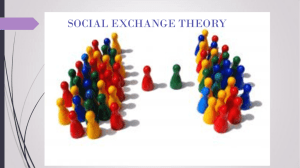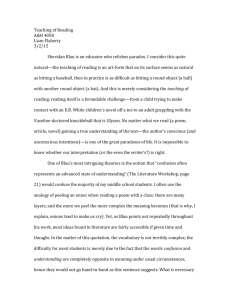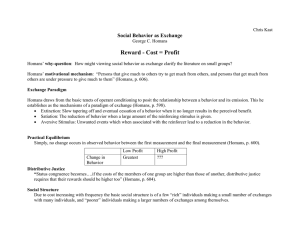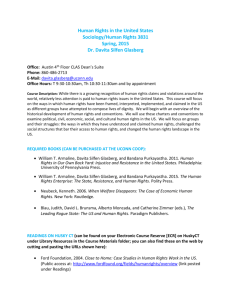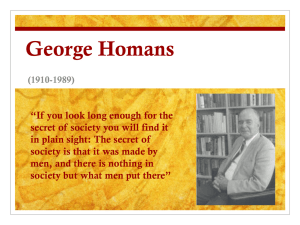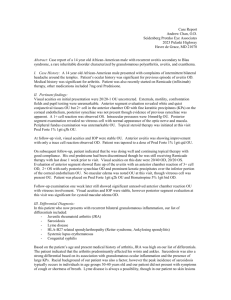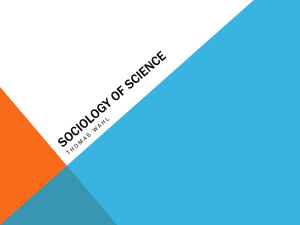Social Exchange
advertisement
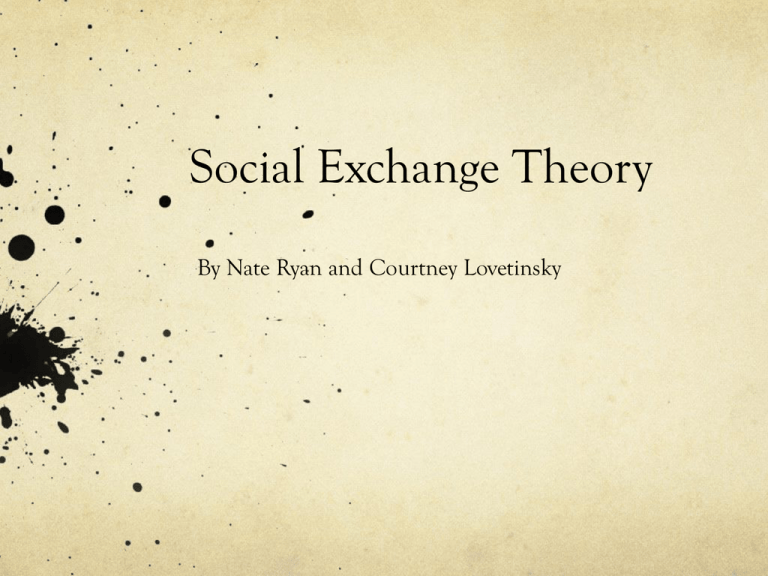
Social Exchange Theory By Nate Ryan and Courtney Lovetinsky Background Originated during 1950s, primarily through George Homans. Illustrates effort to fuse the principles of behaviorism and economics with other ideas and apply them to the concerns of sociologists. Assumes that human behavior can be explained by natural “laws.” Influences on Social Exchange Cultural Anthropology Culture is unique, especially in social rituals Homans concluded societies are not unique and act towards common goals and aspirations for their interactions with others. Psychological Behaviorism B.F. Skinner, viewed social theories as “mystical enterprises.” Distracted sociologists from concrete entities of study. Stimulus-Response notion. When a subject is presented with a stimulus, a response is automatically triggered. Pigeon experiment Human language exists on basis of differential reinforcement. Homans and Social Exchange Homans’s sociology builds on a theory about social life from the behavioristic propositions of Skinner’s Psychology of operant conditioning. Exchange Theory is deterministic and there are two types of determinism. Strong Ontological (nature of being). Weak epistemological (nature of knowing). Denies conscious beings. Utilitarian Economics Basic economic theory rests on certain premises about individual psychology and their implications for peope’s behavior. Rational Choice Theorists developed four basic propositions. Four basic propositions Individuals are rational profit maximizers, making decisions on the basis of their tastes and preferences. The more of something one has, the less interested he or she will be in more of it. Prices are set by tastes of buyers and sellers. Greater the demand, the higher its price will be. Goods are more expensive if sold by a monopolist than if supplied multiple firms in competition with each other. Human Behavior The Five Propositions of All Human Behavior The Success Proposition: If an activity was previously rewarded, then the individual is more likely to repeat the activity again. The Stimulus Proposition: Principle of experience. If a similar stimulus presents itself and resembles an originally awarded activity, the individual is likely to repeat that course of action. The Value Proposition: Principle of value of outcome. The more valuable to an individual a unit of the activity another gives him/her, the more often he/she will emit the activity rewarded by the activity of the other. (watching football) The Deprivation-Satiation Proposition: Principle of diminishing returns. Someone who goes a long time without a desired reward becomes far more willing to engage in behavior that will lead to desired reward. (Being away from loved ones) The Aggression-Approval Proposition: When a behavior does not receive expected reward, the response is anger or aggression. (Students grades) The Group System Elements Activity: What the members of a group do as members. Interaction: Relation of the activity of one member of the group to that of another. Sentiment: The sum of the feelings of group members with respect to the group. Norms: Code of behavior adopted consciously or unconsciously by the group. Power and Authority Homans felt that a person who influences other members has authority. An individual earns authority by acquiring esteem and acquires esteem by rewarding others. Power can be defined as the ability to provide valuable rewards. When directing others, the leader inevitably causes the members to incur costs. The leader’s incurring costs will help prevent conflict. Example: If employees are asked to work late, they will be less upset if the boss also stays and works late. Peter Blau ( 1918 - 2002) " One cannot marry an eskimo, if no eskimo is around." Background • • • • • • Born on February 7, 1918 in Vienna, Austria Immigrated to the United States in 1939 and became an American citizen in 1943, after serving in World War II Received his PhD at Columbia University in 1952 In 1974 he served as the President of the American sociological Association Was an instructor at Wayne State University in Detroit, at the University of Chicago, then returned to Columbia University in 1988 From 1988 to 2000 he taught as an emeritus professor at the University of North Carolina • His Works The Organization of Academic Work (1973) Blau discusses the role of theory as a formal theory from which empirical predictions can be logically deduced plays the dominant role in research that is designed to test the predictions. • Exchange And Power in Social Life (1964) Represents Blau's major contribution to exchange theory similar to Homan's. However, Homans is concerned with setting out a deductive theory of behavior in general while Blau sees exchange as one particular aspect of most social behavior. His analyses suggest how to exchange perspective can provide explanation. • Exchange and Power in Social Life Blau acknowledged his devotion to Simmel's idea of exchange and described social exchange as a central principle in social life, which is derived from primitive terms, and from which complex social forces are derived. Blau's Implicit Exchange Principles 1. Rationality Principle: The more profit people expect from one another in participating in such an activity, the more likely they are to engage in it. 2. Reciprocity Principles: A. The more people have exchanged rewards with one another, the more the reciprocal obligations that emerge and guide exchanges among these people. B. The more the reciprocal obligations of an exchange relationship are violated, the more disposed deprived parties are to sanction negatively those violating the norm of reciprocity. 3. Justice Principles: A. The more exchange relations have been established, the more likely they are to be governed by norms of fair exchange. B. The less norms of fairness are realized in an exchange, the more disposed deprived parties are to sanction negatively those violating the norms. Implicit Exchange Principles Cont'd 4. Marginal Utility Principle: The more expected rewards have been forthcoming from a particular activity, the less valuable the activity is and the less likely its performance is. 5. Imbalance Principle: The more stabilized and balanced one set of exchange relations is among social units, the more likely are other exchange relations to become imbalanced and unstable. Group Formation Blau discusses social exchange and how it must be directed toward other persons; consequently, social interaction begins with social groups. Individuals choose what groups to interact with based on the rewards they can receive. The formation of a group involves development of bonds that unite individuals in a cohesive unit, they are listed as Blau discussed: 1. Impressing Others: Taking risks, performing role distance, and being able to exhibit both strain and ease, depending on the occasion. 2. Social Approval: Humans are anxious to receive social approval for their decisions and actions, opinions, and suggestions. The approving agreement of others helps to confirm their judgments, to justify their conduct, and validate their beliefs. 3. Attractiveness: First impressions can be self-fulfilling as well as self-defeating, along with opinions of others. Bluffing is a mechanism utilized by some people. 4. Love: Love appears to make human beings unselfish, since they themselves enjoy giving pleasure to those they love, but this selfless devotion generally rests on an interest in maintaining the other's love. Bureaucracy & Social Organization • • • Blau defines bureaucracy as: A type of organization designed to accomplish large-scale administrative tasks by systematically coordinating the work of many individuals. His studies began with The Dynamics of Bureaucracy (1955), in which he presented systematic investigations of the bureaucratic structure and function. Throughout his analysis of organizations Blau examined the role of organizational substructures, and found that the system still depends on costs and rewards. Karen Cook ( 1946 - Present) Cook's Background •Born July 25, 1946 in Austin, Texas •Attended college at Stanford University with her twin brother Ken •Received her PhD with distinction in sociology from Stanford in 1973 •Was an assistant professor of Sociology at University of Washington •At Duke University she served as a professor of Sociology •Professor She left Duke in 1988 for her current position as the Ray Lyman Wilbur of Sociology at Stanford University Influences • • George Homans Peter Blau Was employed by Blau, who had extended ideas of Homans • Richard Emerson Like Emerson, Cook began with the basic, microlevel premises of exchange theory. Cook examined the relationship between general exchange and social dilemmas. A social dilemma is: A situation involving a particular type of incentive structure such that, 1) if all group members cooperate, all gain, whereas, 2) for each individual it is more beneficial not to cooperate. Exchange Networks 1. There is a set of either individual or collective actors 2. Valued resources are distributed among the actors 3. There is a set of opportunities for exchange among all actors in the network 4. Exchange relations, or exchange opportunities, exist among the actors 5. Exchange relations are connected to one another in a single network structure Relevancy •The study of power in groups in relationships will always be relevant in sociological theory. •Blau and Cook, along with other theorists have attempted to bridge the micro-macro divide. •All social theories take different approaches to their study of human behavior for example: symbolic interactionism, ethnomethodology, and phenomenology. •Social Exchange Theory is one of the most relevant theories in explanation of human behavior.
